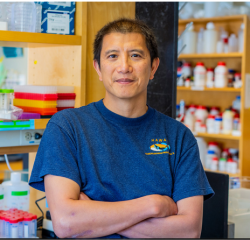
- About
- Academics
- Centers & Programs
- Admissions
- News & Events
- People
Back to Top Nav
Back to Top Nav
Back to Top Nav
Back to Top Nav

Surachai Supattapone, MD, PhD, a professor of biochemistry and cell biology and of medicine at Dartmouth's Geisel School of Medicine, has received a Javits Neuroscience Investigator Award from the National Institute of Neurological Disorders and Stroke (NINDS). The prestigious $4.9 million award will provide up to seven years of funding for his research on prions—infectious agents that cause fatal neurogenerative diseases.
Created by an act of Congress in 1983, the Senator Jacob Javits Awards in the Neurosciences are named in honor of the late senator who for several years was a victim of amyotrophic lateral sclerosis (ALS), a degenerative neurological disorder also known as Lou Gehrig's disease. Javits was a strong advocate for support of research in a wide variety of disorders of the brain and nervous system.
Recipients of a Javits Neuroscience Investigator Award must have demonstrated exceptional scientific excellence and productivity in one of the areas of neurological research supported by the NINDS, have proposals of the highest scientific merit, and be judged highly likely to be able to continue to do research on the cutting edge of their science for seven years.
"I'm delighted to receive this funding award. To me, it's really a recognition of the many valuable contributions that all of our lab members have made over the past 20-plus years," says Supattapone, who joined the medical school's faculty in 2001. "I think this support gives us the flexibility to explore some new directions and ideas with our research that we otherwise couldn't do with a shorter-term grant."
The Supattapone Lab focuses its research efforts on understanding the molecular mechanisms of prions—infectious agents of fatal brain diseases that include Creutzfeldt Jakob Disease (CJD) in humans and bovine spongiform encephalopathy (BSE) or "Mad Cow Disease" in cows. There are currently no treatments for these diseases.
"The thing that makes prions unusual is that they're not a virus, bacteria, or any other kind of conventional infectious agent," he explains. "Instead, it's a protein that we all have in our brains, and what happens is that the protein changes shape into a misfolded form and that's what makes it infectious and able to replicate and destroy neurons."
Supattapone and his research team employ a variety of advanced techniques, using animal, cell culture and test tube models, to study prion infectivity. They were the first to produce infectious prions in a test tube using chemically defined components, and to identify specific cofactor molecules as essential partners in this process.
"We're doing further studies now to better understand how that works, both in terms of how it affects the structure of the protein and what genes might regulate this conversion process," he says. "In addition, we hope that insights from our work will also be potentially applicable to other neurogenerative diseases such as Alzheimer's disease and Parkinson's disease in the future."
"I am very pleased that Dr. Supattapone received this recognition," says Geisel Dean Duane Compton. "It is a well-deserved honor from peers in the field of neuroscience recognizing his many groundbreaking discoveries about the pathologies caused by prions."
Supattapone's leadership roles at Dartmouth have included serving as the chair for the Molecular and Cellular Biology Graduate Program, director for the Clinical Translational Science Master's Program, and director for the Cellular and Molecular Basis of Disease Course. He has been a standing member of two NIH study sections, holds seven patents, and has won several teaching awards at Geisel and at the University of California at San Francisco.
Supattapone was elected as a Fellow to both the American Society for Microbiology and the American Association for the Advancement of Science in 2016. He was named to the Geisel Academy of Master Educators in 2014.